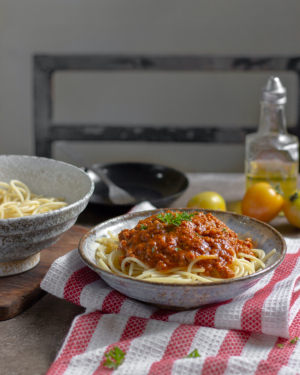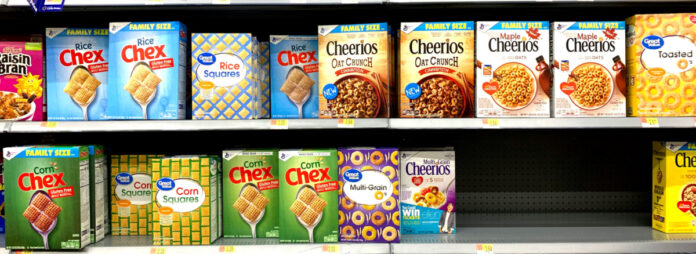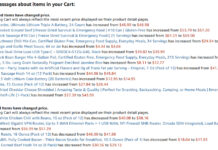We wrote yesterday about how to fight hunger and how the coronavirus is disrupting both food supply chains and people’s ability to make a living.
If you are suddenly out of work, either due to the coronavirus or something else, take advantage of all the safety-net programs that are out there. Apply for SNAP, what used to be known as food stamps. Talk to your social worker and apply for as much assistance as you can get.
Groceries are a big expense for every family, but there are things you can do to save money. If you are no longer working, then you need to be looking at meals differently and shop with discinpine. Here are 27 things you can do to save money on groceries:
1Determine your budget before you enter the store and then add up your cost as you go along to ensure you stay under budget.
2 Before you shop, look at the store circulars or online sales sheets (you can subscribed to get these by email) and decide where to shop based on who has the lowest prices and best sales. Saving 25 cents on a dozen eggs is good, but saving 50 cents for a gallon of milk may be a better deal.
3 Look at what is on sale plus what is already in your fridge, pantry and cupboards and do some meal planning. Add what you need to your list but don’t let sales entice you into buying something your family doesn’t want or won’t eat.
4 When you are meal planning, look at recipes for stews and casseroles. These dishes often allow you to use less meat. They may also give enough leftovers for a second meal. Serve stew on one night, then pour the left overs on top of toast two days later.
5 Search online for coupons. If your store doubles coupons on Tuesday or has any other special deals, go shopping on that day. You may be shocked at how much you can save with coupons, but don’t let coupons trick you into buying something you don’t need. At the end of the day, its how much you spend that matters, now how much you “saved.” There are useful videos on YouTube about how to save with coupons or grocery cash back apps. If you check them out, watch recent ones since something they filmed two years ago may no longer be accurate.
6 When you are trying to save money, you will probably need to avoid things that are organic, meat or eggs that are free range, etc.
7 Focus on foods that provide a full meal at little cost. For example, a box of spaghetti and a bottle of the least expensive sauce should be $3 to $4. That’s dinner for four or more. If that’s too steep, buy Ramen.
8 Look for the least expensive brands, like the store brand or a generic brand. There was a year or two when my dinner was often one of the following: generic mac & cheese, white box-no-name chicken pot pies, the least expensive hotdogs (usually 8 for less than $1), ramen, or rice with barbecue sauce added for flavor.

9 Buy staples, like bread, eggs, oatmeal, peanut butter, pasta, rice, dried beans and vegetables like a head of cabbage. Those are probably your most efficient sources of food for your dollar. A canister of oatmeal can provide a filling, healthy breakfast for weeks.
10
Buy dark meat chicken, like the legs and thighs, instead of the more expensive chicken breasts.
11
If you buy red meat, pork is probably going to be cheaper than beef. Try to buy the least expensive cuts.
12
Eat your leftovers for lunch or a snack. If someone complains that they are hungry, offer them the little bit of leftovers from dinner two nights ago. If they don’t eat, then they weren’t that hungry. Don’t let kids confuse boredom with hunger.

13
Home-popped popcorn can be an inexpensive snack or a treat and its easy to make on the stove top. Avoid the microwave bags which are much more expensive per serving.
14
Consider eating pancakes for dinner once a week. The kids love them and they are very filling. Nothing wrong with eating eggs for dinner either, especially if you had oatmeal for breakfast.
15
Comparison shop between fresh and frozen vegetables. You may save money by buying frozen and they will not rot or go bad before you eat them.
16
Bake for yourself. A five pound bag of flour can make 5 loaves of bread, and it’s better and more filling than store-bought.
17
Also look at bulk pricing and larger items. Sometimes you can buy a 5 pound bag of onions or potatoes for the price of a couple hand-picked loose onions or potatoes

18
See if the store has a day-old rack or a clearance rack. One store I shopped when my kids were little would mark all their fresh-baked breads down at 7 p.m., often more than half off. We did a lot of shipping at 7:30 p.m!
19
Don’t buy soda, flavored water, juices, alcohol, etc. If you insist on flavoring your water, brew ice tea.
20
Don’t buy junk food. If it’s on the cookie, dessert, or chips aisle, you probably don’t need it, you just want it. When you are broke, you only buy the basics.
21
Don’t buy dessert or other sweets unless it is a birthday or other celebration. They are a huge waste of money and usually empty calories. Try serving a piece of fruit as dessert.
22
Don’t buy any single-serving dishes; they are the most expensive per serving. Shop smart and buy a 5 pound bag of rice rather than a few ounces in a pouch with a pretty picture and some flavorings. Buy the big tub of yogurt rather than the individual serving cups.
23
Don’t buy any single-serving dishes; they are the most expensive per serving. Shop smart and buy a 5 pound bag of rice rather than a few ounces in a pouch with a pretty picture and some flavorings. Buy the big tub of yoghurt rather than the individual serving cups.
24
Likewise, check the pricing with shredded cheese. It’s probably cheaper to buy the block of cheddar or mozzarella and shred your own.
25
Avoid the deli, and if you buy pre-packaged lunch meats, buy bologna or whatever else is cheap.
26
Don’t buy out of season or non-local fruits, like berries. Those little tins for $4 offer very little nutritional value for your dollar. (Going to local U-Pick operations may be a better bet.)
27
Shopping on a limited budget requires discipline. Don’t bring the kids or your spouse if they ask for thing or add things to the cart.







